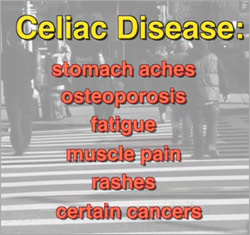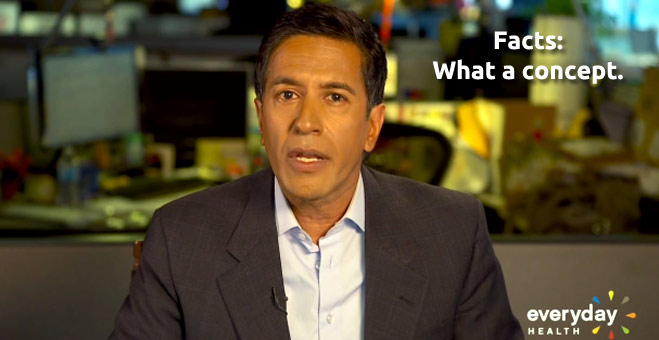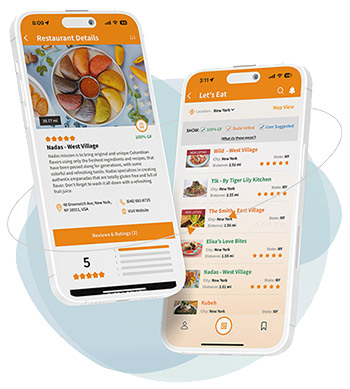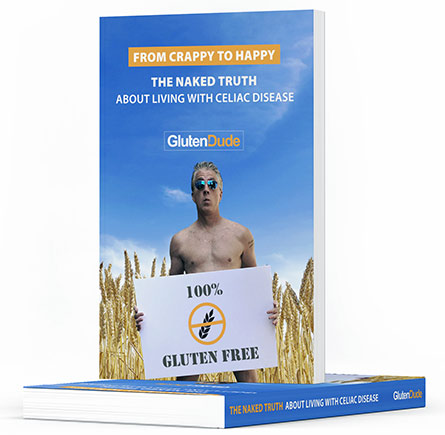After last week’s major media fail, it’s oh so nice when it’s done right. In the video above, Dr. Sanjay Gupta discusses the facts about gluten and celiac disease (yeah, I know, facts…what a concept) and talks about why the wrong people are going gluten-free. This is music to my ears.
Here are some highlights:
– He starts if off by saying that 1/3 of all Americans are now trying to avoid gluten. I still find that number stunning.
– He then says a lot of people who are on a gluten-free diet shouldn’t be and many people who should be avoiding gluten aren’t. How did things get so backwards??
– They actually spelled the word “celiac” correctly. Sorry…I couldn’t resist.
 – While many stories of celiac pooh-pooh the symptoms, they treat it with the seriousness it deserves. See the pic to the right.
– While many stories of celiac pooh-pooh the symptoms, they treat it with the seriousness it deserves. See the pic to the right.
– Even crumbs can do damage. Amen Sanjay.
– He brings in an MD from the Mayo Clinic. That’s right…they actually bring in an expert to talk about celiac disease; not an author, not a celebrity. Are you listening Today Show?
– 1.8 million people have celiac disease. But 1.4 million don’t know it. That is frustratingly sad that many are needlessly suffering.
– Sanjay says that’s because the gluten-free message is reaching the wrong people. This is what I’ve always said. The food manufacturers and marketing companies are profiting at people’s expense. Because it’s become such a fad, the people who NEED to hear the message aren’t getting it.
– He calls out Hollywood celebrities for sending the wrong message. I smiled.
– 1.6 million people are on a gluten-free diet who don’t need to be. This is almost the same number that are not on the diet but do need to be. We’re living in Bizarro World (a Seinfeld reference for those under who are much younger than me.)
– He correctly points out that there are those who have gluten intolerance/sensitivity and not celiac disease, but would still benefit being on a gluten-free diet. He could have given this a bit more weight, as I know many suffer without an official celiac diagnosis.
– He finishes it off by saying if you think you have a gluten problem, get tested.
Thanks Dr. Gupta for this common sense approach. May others follow your lead.






Well, thank God for some sanity on the part of the professionals!
Man, now I feel I totally screwed up. I never received a blood test from my doctor, but I suspect that I have it (because of the plethora of issues that I endured including IBS(severe gas and diarrhea), non alcoholic fatty liver syndrome, bad eczema, back rashes, migraine headaches, anxiety and thyroid issues. They began to clear up when I cut out all grains, but crop back up whenever I’m exposed to gluten and/or soy.
I’ve been gluten free for eight months, thanks to the SCD which I started for IBS issues. I really want to get a blood test for a definitive answer, but I’m afraid that if I take the test after months of being gluten free, I’ll get a false negative result.
Will I have to stuff my face with gluten-containing products (which make me really sick) before I take the celiac blood test to find out whether I actually have celiac disease?
The unfortunate answer is yes…you need to be eating gluten to get an accurate diagnosis. This is a dilemma for so many people in your shoes.
How long will I have to eat the poison before the test :)?
I’ve heard varying answers and I don’t want to lead you astray. I think it’s about five years. Totally kidding. If you forced me to guess, I’d say about a month, but somebody else may have a better answer.
I was supposed to eat gluten for a month to get my test done but only lasted 2 weeks (this is after being gluten free for a while). The test came back and they said I don’t have celiac so clearly I just have a really severe intolerance.
The advice in the UK is that if you have gone gluten free, then you need to eat the equivalent of 4 slices of gluten free bread every day for 6 weeks before testing for CD. This might be different in the US.
Not gluten-free bread (sorry!). Gluten CONTAINING bread.
I think I’ll pass taking the Celiac Disease, then. I can’t do bread anymore. Wheat makes me sick. When I cheated on my grain free diet to eat some grains, I learned what the consequences were, the hard way. And six weeks of intentionally eating something that will literally make me sick just to get a “positive” result on a test, isn’t worth it in the end for me. I don’t think I’d enjoy waking up in the mornings sick to my stomach on a daily basis for six weeks.
Although it would have been great to know definitively, I like being not sick even more.
Uh, I meant to say “Celiac Disease Test”
The recommended time frame for a gluten re-challenge varies because, unfortunately, there is no way to tell in an individual how long it would take to raise antibody levels or produce villous atrophy that will show up on a biopsy.
That said, the Univ. of Chicago Celiac Center say this:
“Q. I self-diagnosed and started a gluten-free diet. Do I have to eat gluten prior to getting screened for celiac disease?
A. Yes. We recommend 12 weeks of a gluten-containing diet prior to blood testing (2 weeks prior to a biopsy). However, you could first take a genetic test that would tell if you have the genes for celiac disease. If the genes are present, then 12 weeks with gluten in your diet prior to your blood analysis and, if your blood shows elevated antibodies, a follow-up biopsy will give you the most accurate results.
It’s entirely possible, of course, to have an adverse reaction to gluten, but not have celiac disease. In these cases, there are still important reasons to understand your situation. Celiac disease is hereditary, 1 in 20 first-degree relatives (kids, siblings, parents) and 1 in 39 second-degree relatives (aunts, uncles, grandparents) may also have it. Knowing if you have it is important to your family. We urge those who have screened negative, but have had the symptoms to take the genetic test (which does not diagnose celiac disease, only the potential for it and does not require eating gluten) so that others in your family can be aware of their prevalence for the disease. In addition, the prevalence of multiple autoimmune diseases in one person is on the rise—for this reason we ask that you do what you can to diagnose and understand your own health risks.”
I went on a “gluten challenge” for 2 months prior to being tested. Two months of sheer hell but I tested positive.
Was getting the official diagnosis worth it? I only ask because so many people ask me what they should do. Thanks.
I’m curious to know this, too. I tried going GF for about 5 weeks last summer and saw no difference, so I assumed I didn’t have celiac but decided to go back on gluten and get tested anyway, just to rule it out. Then it turned out I did have celiac disease. Just not the kind that gets better in 5 weeks. Lucky me! 🙂
I’ve always wondered if I would have been able to get back on gluten and get tested if I had felt better right away during the GF trial. It seems like an incredible feat of willpower/delayed gratification!
Was it worth it? You should do a blog post (or I should do a letter to you detailing my gluten challenge?)
Yes, ultimately it was worth it (now that it’s been nearly 4 months later) but I was begging to quit after a month. During the challenge I developed neuropathy, ataxia, arthritis, 3 different types of skin rashes, multiple mouth sores, and stabbing pains in my lower abdomen. I aged a year ever day I was on the challege because I truely felt 127 by the end.
It was worth it because without it I think I would have let gluten seep into my diet and have remained low-level sick. I had to go through super-high-level sick for 2 months so that I have a chance of being completely well. Does that make sense?
It’s sad that my addition skills are so weak considering that I have a BS in math. 60 + 47 = 107 not 127. 🙁
Darlena,
I commend you for persevering through that gluten head horror to get a firm DX.
(There’s no way in hell I could survive more than a few days if I ever had to regularly consume gluten again).
You’re very brave, IMHO
The problem with this diagnostic “challenge” lies in the fact that doctors subject people to it, risking their health and causing multiple problems. Too many quit because they cannot stand it anymore or they end up in the ER with life- threatening complications (intussusception,heart arrythmia, hypertension, etc.) or they are so neurologically impaired, they cannot drive, think properly or function at work . Some docs will DX right then, citing symptom recurrence as “proof” enough.
There has to be a better way. Dr. Fasano has suggested a DX can be made from a combination of factors, in the absence of the “gold standard” biopsy done by challenge.
I understand completely why people refuse to do that to themselves, but some do it because they feel they need a DX on paper for validation, proper follow up care and to convince other family members that it’s “real”and they need to be tested, too.
.
I am in the same dilemma today. My rheumatologist told me I would have to be back on gluten containing foods for two months before I could be officially tested.
Glad to see someone getting it right. But here’s something I wonder about when I see these numbers… Why does everyone seem to think that there isn’t any convergence between the ‘unknown celiac’ population (1.4 million) and the 1.6 million who are (supposedly) avoiding gluten for no reason? I mean – we really don’t think that many of these 1.6 million gluten avoiders might actually HAVE celiac and were just never able to get a diagnosis?
Perhaps the message about gluten free eating is reaching at least SOME of the right people – but, unfortunately, it isn’t reaching the medical establishment, so they aren’t being properly tested for celiac. Just a thought.
Great insight Kate. The medical community is still so behind in all of this.
Sanjay Gupta is always a professional – so rare in the media today! But I have to question the numbers, just like Kate above. To say that the wrong 1.6 million people are eating gluten-free is ridiculous. Sure, some of them are fad dieters (but I’ve yet to meet one of those) but many of them are people I do know, people with debilitating IBS, children with autism, families with young kids with excruciating eczema, chronic migrane sufferers,people with other autoimmune disorders, families with kids struggling with adhd, people with mental health issues such as bipolar… they dont have celiac but they do have health problems that seem to benefit from gf. And then of course are the masses that have yet to receive a dx from their celiac-clueless docs…. too many people are self diagnosing because the medical community is missing dx, and its likely they’ll never get dx.
Its a new day, people are taking their health into their own hands because the medical community doesn’t have the answers.
I too am not sure where all of these gluten-avoiders are hiding. I live in Brooklyn, so you’d think they’d be here if anywhere. Though maybe Brooklyn hipsters, more than, say, Portland hipsters, are of the “I want ALL the gluten” variety rather than the trendy gluten-avoiding variety.
But anyway, good for Sanjay for doing a much better job of the GFD coverage than anyone else so far. 🙂
AMEN!!!
Please send this man to the UK – he can join forces with the sensible people who tell the world how it is (Dr Chris Steele and chef Phil Vickery) and hopefully outnumber the idiots (chef Anthony Demetre and mathematical genius/fad dieter Carol Vorderman).
I’m with KateJ, we want him here 🙂
Fantastic to find a positive story, thanks Dude
OMG the security question is back!! (I don’t mind really, I feel a small victory each time I get it right 🙂 )
Also, big kudos to that celiac specialist Dr. Murray for telling it straight.
It’s not that this supposedly “rare” disease is suddenly increasing in numbers, it’s because people are finally being diagnosed correctly. (but even the diagnostic criteria has its flaws– as we all well know)
And it is not diagnosed often enough–as most of us were left unDXed for most of our lives based on this erroneous thinking.
Naysaysers within the medical community itself make it even harder for people to be taken seriously.
We need less sick people falling through the cracks because of these factors and we need more doctors embracing the reality of non-celiac gluten intolerance.
The shift will come. 🙂
It will indeed Irish…we all just need to keep the faith.
yup,…hope and faith and promoting awareness, my friend. 😉
This is definitely a step in the right direction for us! Thanks for sharing Dr. Gupta’s clip with us. I barely watch television but it is awesome that you have been sharing all of the news clips and talk show bits with us! Thank you Dude! I’ve noticed that overall people seem much more aware of gluten and Celiac than they did back in 2010 when I was diagnosed…has anyone else noticed this?
Definitely more aware of gluten. Celiac…not quite as sure.
Agree.
Seems like everybody talks about gluten now and people do seem to know what the “gluten free craze” is, thanks to the celebs and the food industry jumping on the bandwagon, but celiac? still SO greatly misunderstood, I’m afraid.
We still have much work to do.
Thank you so much for sharing this Gluten Dude. It’s a huge relief to see a thoughtful report on this subject. Finally!!
You are quite welcome Steph.
I love that he says to get a blood test, but I hate that it leaves the impression that if your blood test is negative, you can eat all the gluten you want. Not sure if it’s just me, but my blood test was low negative (deamidated) after glutening like a mo-fo for a couple of weeks prior, but my biopsy (after GF for 6+weeks) was “consistent with Celiac sprue”. Still trying to convince my husband that crumbs in food make it inedible for me. Basically, the testing sucks for this, particularly when you get into non-Celiac gluten sensitivity, and even when you’re diagnosed, people STILL don’t get it! Sorry to vent on your page. BTW, I love cruisin’ around your page, reading your stuff.
Never a need to apologize for venting on my site.
I find this blog interesting, Dr. Sanjay Gupta is saying that 1/3 of all Americans are trying to avoid gluten.
Halleluiah!
It would be good to see this catching on in Australia.
June 2012
1 in 4 people morbidly obese.
1 in 4 people type 2 diabetic.
Australian Govt policy for the past 30 years, has been to over produce wheat. Excesses in production get added to 90% of food products, including rice bubbles.
1 in 6 people in their 40’s becoming gluten intolerant or Celiac.
Gluten makes your upper belly bloat.
First symptom of Diabetes 2 is bloated belly.
Celiac sufferers, tend to be skinny.
So wouldn’t it be good if the left hand spoke to the right hand?
Michele Richards